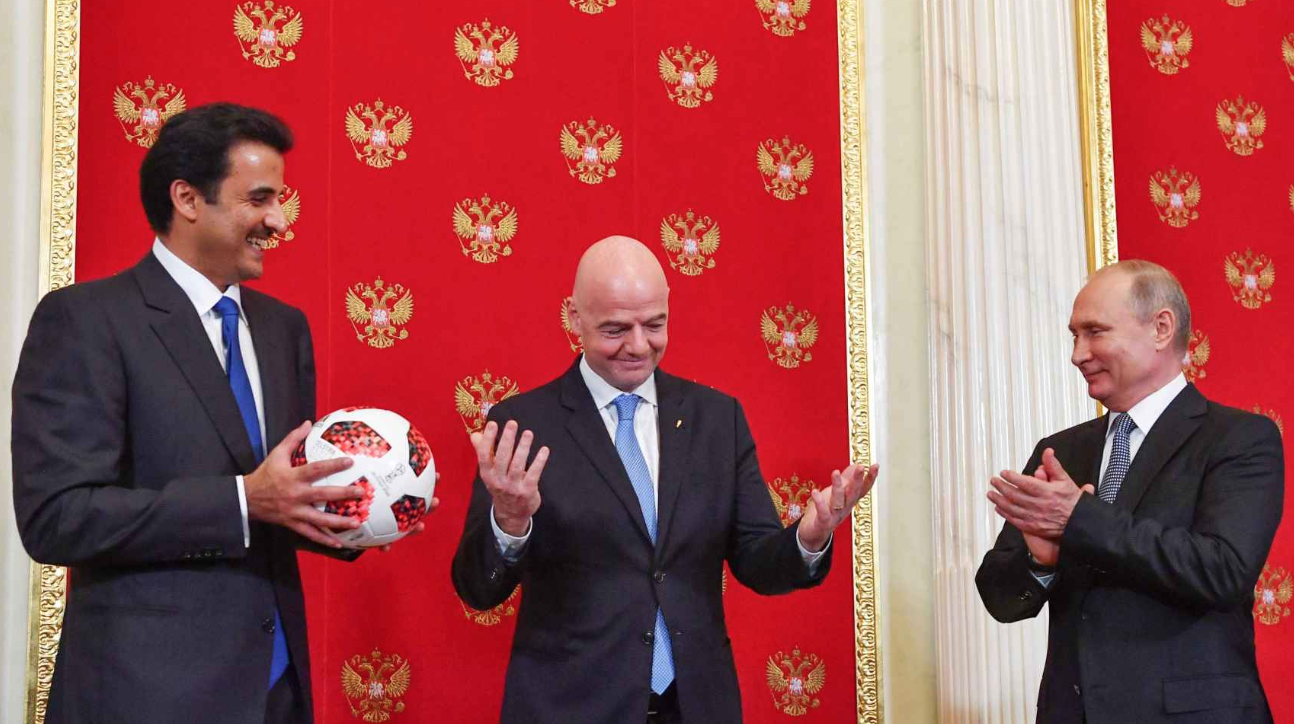The World Cup in Qatar was marked by polemic: from the controversial awarding of the emirate as host to the living and working conditions of thousands of migrant workers, to the threats to the players in the event of joining a demonstration. These marks on soccer’s greatest event challenge the acceptance of the authoritarian practice.
The Political Dialogue team has reflected on this carefully with its network of Latin American authors. It is in this spirit that this special analysis offers diverse views on an event that will perhaps remain in memory as the World Cup of silent and silenced protests.
Red card to FIFA
Qatar, almost contradictorily, wanted to show that the freedom of those who shout a goal is possible in a country of prohibitions. In fact, FIFA bought this idea: an exotic Middle Eastern location as the venue for the most important event on the planet, why not? There were many reasons why that option was a bad idea, and now they are more evident: sanctions on diversity, restrictions on freedom of expression, male tutelage towards women, and a controversial labor system supported mostly by immigrants. Let’s not forget the opacity and allegations of corruption.
Fortunately, global attention was not only focused on the ball rolling down the field, but also on the high cost of those minutes of play beyond soccer passion. But of course, it’s not enough. Even if FIFA says otherwise.
A different kind of protest
In the most globalized sporting event, the Iranian national team was moved by the refusal to sing the national anthem of their country, before playing the match against England, which they lost 6-2. A gesture of silent recognition of the protests in Tehran for the death of the young Kurdish woman Mahsa Amini, under police custody for allegedly not respecting the compulsory dress for women imposed by the regime of Ayatollah Ruhollah Khomeini. The most effective and heroic denunciation of barbarism turned the defeat on the playing field into a great moral victory in the arena of Qatar.
Globalization and legitimization
Soccer World Cups have always been spaces of political legitimization. Many times emerging, peripheral, displaced nations seek a seat of recognition through organizational and sporting success. But it is no longer fascism or the Cold War, but the world of postmodern capitalism.
We fill with content and meaning these contests that, in reality, are traversed by marketing, the globalization of the spectacle, and the delocalization of the game. The overwhelming majority of players, even those from the global south, are developed by transnational clubs in the Spanish, English, German, Italian or French leagues. The status of the club owner says more about a dominant position on the global scale, which in the end tries to standardize on values that are not democratic, but those of marketing.
When FIFA president Gianni Infantino said he felt like “a Qatari, a woman, a migrant worker, an African, a gay”, he was eloquent: to be everything without being anything is perhaps the most complete expression of our times.
Soccer as a motive
In 1952, Alan Turing was convicted of homosexuality and chemically castrated under English law. In 1958, in Brussels, the current capital of the EU, the International and Universal Exposition took place, and the last of the several human zoos that were common in Europe until well into the 20th century to show “exotic” people was presented. Until 1956, racial segregation was legally in force in the United States, where “second-class citizens” were unjustly treated unequally, just because of their skin color.
Persecution and punishment on the basis of sexual identity; demeaning and humiliating treatment of those born in unfamiliar places; segregation on the basis of skin color. Seen from a historical perspective, the moral frameworks within which the citizens of the modern West lived even in the second half of the 20th century are abhorrent and profoundly contrary to human rights.
Moral frameworks change slowly, and only through dialogue and joint reflection – and not by imposition – have Western societies transformed their values, and from there they recognize and protect the fundamental rights of human beings. Getting this far has required tolerance and dialogue. If the West wants to accompany Qatari citizens on their path to building a society with more rights, then every opportunity must be seized, far from boycotts or threats, to lay the foundations for a plural, open and free dialogue. The World Cup is one such opportunity.
Taking care of the round
After Italy in 1934 and Argentina in 1978, Qatar in 2022 is the third World Cup to be organized in a dictatorial country. Without taking into account Russia (2018), where regular elections are held, but far from international standards of transparency, pluralism, and legitimate competition.
This is a historic event that exposes the existing gap between soccer and democracy. What rules the ball are the numbers, the profits, and the business. It is clear that, as long as they do not produce exorbitant profitability, freedom of expression, women’s rights, and sexual diversity are not priorities for FIFA.
It misses an incredible opportunity to educate by the most popular sport on the planet. I have no doubt that, just as the great authoritarian regimes have used football as a propaganda machine for their regimes, open systems must associate soccer with noble values such as freedom and equality. In other words: take care of soccer, not get it dirty.
Defense of democracy and pluralism
This World Cup has brought together the great debates of our time. From the abuse of the human rights of workers hired for World Cup sites, such as the banning of the One Love armband, to the brutal murder of Mahsa Amini and the Iranian women’s protests. With the World Cup as a backdrop, we have a split screen where through sport we see the absence of freedoms suffered by some, while others take advantage of it to express their solidarity with political causes.
“The ball does not stain”
Qatar told us nothing at all about defending democracy and pluralism. Attaching political intent to the global soccer contest or using national teams and their players to pass political messages is wrong. It goes against the spirit of the game.
I agree with FIFA when it prohibits any political or vindictive slogan using the screen that the game provides for a little more than 90 minutes. The great Diego Armando Maradona had already said this in front of crowded Bombonera, in one of his many attempts to become Boca’s Ten again. He said: “The ball does not stain”. And with five words, he summed up what soccer should be, a game, a simple game.
Democracy, pluralism, respect for human rights, respect for minorities, and all the rest are not soccer matters. It has nothing to do with it. It is a political matter.
Transparency is essential
Transparency is the enemy of autocracies. Any type of information that does not pass through the control and eventual censorship of the Government becomes a threat. Especially if the country seeks to maintain a friendly and positive image on the international scene despite the fact that within its borders the most fundamental rights are not respected. The problem for these states arises when the visibility is enormous since the control of the flow of information is lost. And this is the case when a World Cup like Qatar is held.
Some voices have considered it a mistake to hand over the organization to this country where there is no rule of law, even going so far as to promote a boycott of the tournament. However, as the representative of Transparency International, Sylvia Schenk, explained on German television, the visibility inherent in a World Cup can force Qatar to improve the living conditions of its inhabitants, as well as to increase respect for human rights. A position that may be shared by few, but which holds an important quota of realism and optimism. Perhaps this sporting event will be the starting point.
Unsustainable
Qatar suggests a bubble removed from the reality of so many. The inhabitants of Ukraine are facing a terrible winter. Millions of migrants board barges to drown in the Mare Nostrum and climate change is increasingly taking its toll with extreme events. In contrast, Qatar uses air-conditioned stadiums, transportation systems that many countries would wish for, and unparalleled luxury is exhibited with a total lack of modesty and celebrated by journalists in pursuit of an exclusive story. Perhaps someone will estimate the carbon footprint of this World Cup. Maybe someone will reflect on its energy and therefore climate costs. On Sunday, the party ended and, with it, the cup dreams of many. The consequences will persist and perhaps someone will ask us at some point what we were thinking when we were shouting goals and admiring palaces built on oil wells. Definitely unsustainable.
*Text originally published in Diálogo Político
Translated from Spanish by Janaína Ruviaro da Silva
Autor
Diálogo Político is a platform for democratic dialogue between political influencers on Latin America. Dissemination window of the Konrad Adenauer Foundation in Latin America.











